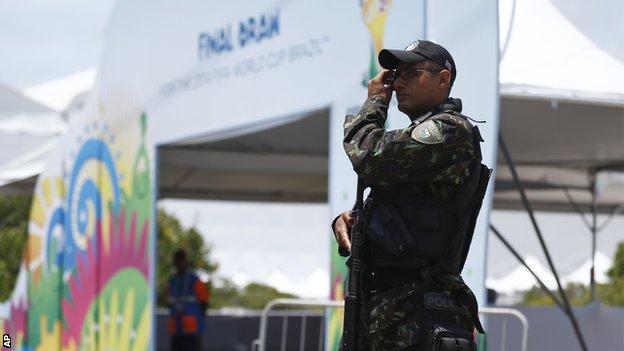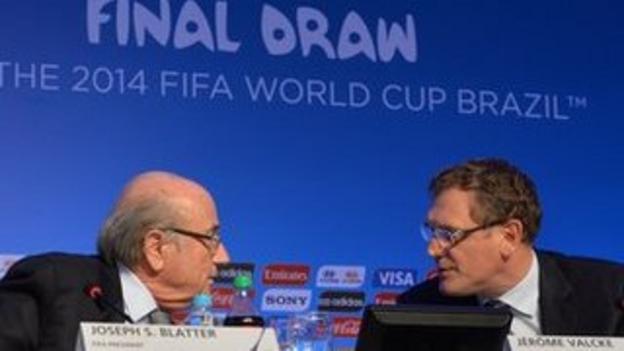World Cup 2014: Questions raised over new draw format

Last updated on .From the section Football

In Brazil
Amid all the talk of French conspiracies, the sinister "Pot X" and 45-mile security cordons it's easy to forget today is only the draw for the World Cup.
But then football's world governing body Fifa don't tend to do understated and the one-and-a-half hour show here in Costa do Sauipe will be another jaw-dropping reminder of the scale of the World Cup now.
To give you a bit of context, the budget for this draw alone is more than £10m.

And while Fifa says there are just 300 security guards on duty, the real number must be many times that when police and military personnel are taken into account.
The decision to stage the final draw here - 76km up the coast from Salvador - was taken long before the anti-World Cup protests started in the summer but organisers must be hugely relieved they chose such an isolated location.
For England's delegation, the biggest worry must be that they will fall foul of Fifa's decision to come up with a new format for the draw on the eve of the event.
Back in 2006 - the last time there were nine unseeded European teams - Fifa picked the lowest ranked qualifier, Serbia and Montenegro, and placed them in a separate pot away from the other European countries.
This left them facing a much tougher group of Argentina, Netherlands and the Ivory Coast and they were eliminated in the group phase.
There were only eight seeds in 2010 but with nine again for 2014 many expected Fifa would use the same system as in 2006. If that had happened then the French - lowest ranked of the unseeded European teams - would have been switched leaving them facing, potentially, a much more difficult group.
Instead, Fifa will conduct a pre-draw of the European unseeded sides to see which one is then placed with one of the four strongest teams from South America.
On Thursday the Fifa general secretary Jerome Valcke faced claims that this was all part of a French conspiracy with Michel Platini, the head of Europe's governing body Uefa.
He and Platini have dismissed the suggestion and Valcke revealed there were three different proposals for dealing with the problem and in the end this was the one chosen by the heads of the six continental federations.
But whatever its origin it does raise the prospect now of England being given a far tougher draw.
Speaking to the England manager Roy Hodgson on Thursday, he seemed relaxed about what fate might lie in store for his team next summer.
He probably pitched it just about right when he said that while he admired and respected a number of the big teams, he didn't fear any of them. Expectations around this England team are now much lower than in the build up to South Africa four years ago.
And Hodgson is experienced enough and wise enough to know that even an apparently easy draw for England is rarely straightforward.